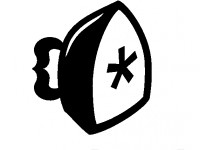This is part 4 of a 5 part interview with 84 year old Ohio author Jack Matthews. See also: Part 1 , Part 3, Part 4, Part 5. Also: Jack Matthews (an introduction), Jack Matthews: The Art and Sport of Book Collecting and On Choosing the Right Name for a story character by Jack Matthews.
Can you talk about authors who have influenced you during various stages of your life? What was the first literary work that really made an impression on you? 
I remember having Joseph Conrad’s late novel, THE ROVER, assigned in a high school English class, but reading it anyway, & while reading it, pausing on a page to contemplate how wonderful it must be to create such realities. (When I mentioned that in a biographical essay, my editor got back to me about the word "anyway" saying that sounded like I wouldn’t normally have read it. I told her that was correct — for I was a relaxed under-achiever as a student). Earlier influences? No particular author, with perhaps the exception of Kenneth Roberts, whose historical novels I greatly enjoyed when I was a pup. Later, however, I was greatly moved/influenced by reading the novels of Balzac. Then, of course, Mark Twain (I have a pretty good Twain collection of 1st editions, ephemera, etc.). Still more recently, I’ve loved the Rex Stout Nero Wolfe novels (I’ve included "A Sheep In Wolfe’s Clothing" in one of my books on bibliophily; and of the 20 or 25 books I’ve re-read, a half dozen are Rex Stout’s Nero Wolfe mysteries). Most recently, I’ve gotten to collecting the 1st editions of Christopher Morley — a wonderful writer , woefully neglected by English Departments. I published an essay on his writing in the ANTIOCH REVIEW a year or so back, and just recently got a letter from a "kinsprit" (CM’s neologism) in the Czech Republic, sharing his own enthusiasm for CM (he’s not a native of the Czech Republic, but an American living there). Another recent book I’ve liked & admired: William Gaddis’s novel A FROLIC OF HIS OWN, a wonderful legal satire. And just now, I’m reading my 2nd Lee Child suspense novel — great fun for the 12-year-old that lives on in every man, if he’s not impoverished in pizzazz.
Can you please mention titles?
Titles I remember with special fondness: Balzac: PERE GORIOT, EUGENIE GRANDET. Old Goriot was a wonderfully obsessed character in his love for his daughter. I tell my students that the most interesting characters are the most interested, and the extremity of being interested is obsession. EUGENIE GRANDET was also obsessed — with money — and he has one of the great melodramatic scenes in all lit, when he’s dying and a priest leans over him to administer the last rites and Grandet grabs at the priest’s golden cross swinging above him. Mark Twain? LIFE ON THE MISSISSIPPI is my favorite. Also some of his short stuff, his obiter dicta and his generally flamboyant personality and his great wit & sensitivity behind all the clowning. Christopher Morley? His richly autobiographical novel, JOHN MISTLETOE, and his splendid novel, KITTY FOYLE (Ginger Rogers won an Academy Award for playing the part, but the movie doesn’t come near the novel.) Also, his many books of essays — they’re all wonderful. And THE SEACOAST OF BOHEMIA, about his helping found and run a theatre in Hoboken, may be the happiest book I’ve ever read. Rex Stout? How about THE DOORBELL RANG for a start?
How did the Great Depression affect your early life? Can you think of ways it has influenced your themes or artistic perspective? Do you think writers of personal genres like poetry and fiction change their focus to social and economic issues during times of economic crises?
I had a wonderful childhood and didn’t know there was a Depression. My father was an attorney, born on a farm in Gallia County, Ohio, who studied law under a country judge, passed the bar and eventually had his own law firm in Columbus. I can remember WW1 vets selling apples on the street, but for some reason this didn’t register with me as hardship. I suspect I’m a bit deprived of the social conscience required of liberals, which is why I’m a Teddy Roosevelt Republican (unfortunately, he’s dead). Actually, I’m pretty much of an independent, thinking that the chief error of Republicans is the assumption that people are grownup, rational and honest; on the other hand, the chief intellectual sin of the Democrats is their assumption that people don’t have to be any of those things.
Life in the zoo — which brings up Mencken’s statement that democracy is letting the monkeys run the zoo, which isn’t too far off target. As for the Depression and its fiction and movies: I think people were both more innocent then and more mature. How can that be? I’m not sure, but I suspect I could come up with reasons if I had to.
Your biographical information shows that you’ve taught for several decades. Before that, you served in the Coast Guard for two years and worked at the Post Office for nine years. Can you talk about that time period and how it relates to your later career? What sort of people and things were you coming in contact with?
I remember reading Jack London’s THE SEA WOLF when I was a radioman on the Coast Guard Cutter Maclaine in the North Pacific, on anti-submarine patrol out of Sitka & Juneau. It was wonderful, for this was the very sea that Wolf Larsen sailed in. When I graduated from OSU in 1949, I worked at a variety of jobs: door-to-door salesman, produce warehouseman, even a part-time private detective for a few cases. Then, married & with 2 young daughters, I got a job in the Parcel Post station in Columbus, Ohio, where I worked for 9 years. Most of my fellow workers were black men, which made me a bit uncomfortable at the time (yes, I had some share in the racism of the day), but eventually I learned to like & respect them, & now, with the great social change we’ve gone through (a testament to our health as a society), I’m grateful for getting to know those guys. I only wish the blacks who are celebrated today–hot-dog athletes, rap "artists" (Rembrandt & Beethoven were artists, not those loud dolts!)) & the so-called black "leaders"–I only wish they had the better qualities I found in those black men I worked with all those years ago; those guys deserved better.
What was your family life like in the 1930s and 40s?
As I mentioned, I had a wonderful childhood. I was indulged far more than most children were. Our solid middle-class neighborhood in Clintonville (Columbus, Ohio, ) was a perfect place for a young boy growing up. (Our family also took wonderful fishing trips to Michigan, Canada, Minnesota; and my dad took me deer hunting to Michigan in 1939, then to Pennsylvania and Maine in the next 2 years). I only wish I’d known then how privileged my life was and could have manifest it to my parents and older sister (my only sibling, who died in 1975 at the age of sixty). But I guess we all have guilt — to be deprived of it is to be deprived of what it is to be human. As I tell my students, if you don’t have a guilty conscience, you don’t have a conscience at all. And why would I teach this to students in my English classes? The answer is yes.
The filmmaker George Lucas once said that he intended his 1972 film American Graffiti to be a kind of anthropological study of a California teenage fad of "cruising" in their cars to meet girls. The film was a way to document and preserve an aspect of California culture that no longer exists. Can you point to any of your works which — apart from literary merit — document aspects of American society and culture which may no longer exist?
Many of my novels and stories celebrate the time of their creation. Time and geography are always part of what we are. My novels, HANGER STOUT, AWAKE!, BEYOND THE BRIDGE, and THE CHARISMA CAMPAIGNS are a sort of trilogy, all having been inspired by an old-maid high school English teacher I invented, Miss Temple, who said that everyone should keep a diary or journal, for in sitting down to write about something, one creates the thing itself — presents it as well as represents it. (This is, of course, a writerly thought — but as true as a pipe wrench.) Anyway, these 3 novels are all very much part of the 1950s to 1970s — a time when Hanger, for example, could work at a full-time job pumping gas at a small-town Ohio/Sohio station. Such a job makes no sense today, & tomorrow it will be even more anachronistic.
When did you decide you wanted to be an author?
An interesting question, indeed; but unanswerable. Like, when did I become an old man?
Coming Next: Jack Matthews Interview Part 3: Book Collecting.

































